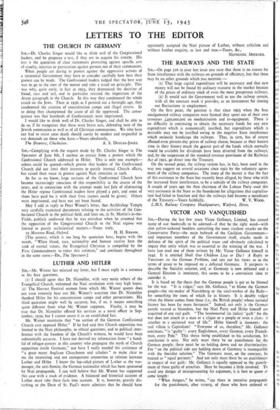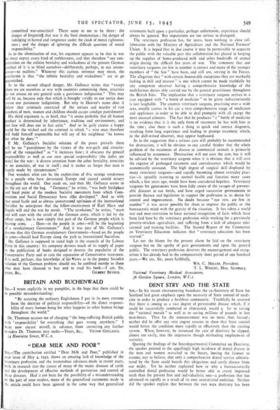VICTOR AND VANQUISHED
SIR,—During the last few years Victor Gollancz, Limited, has caused many of our bookstalls to be adorned—if that be the right word—with slim yellow-jacketed booklets containing the most virulent attacks on the Conservative Party—the main bulwark of the Coalition Government— and important members of the Government itself, attacks made in defiance of the spirit of the political truce and obviously calculated to impair that unity which was so essential to the winning of the war. I have just read one of them written by Mr. Victor Gollancz himself in 1942. It is entitled Shall Our Children Live or Die ? A Reply to Vansittart on the German Problem, and sets out his views as to the terms of peace to be imposed on a defeated Germany. It purports to describe the Socialist solution, and, as Germany is now defeated and a General Election is imminent, this seems to be a convenient time to consider it.
It is based on ffie thesis that the German people is not to be blamed for the war. "It is vulgar," says Mr. Gollancz, "to blame the German people—the toy-maker of Nuremberg or the steel-worker of the Ruhr— for something the roots of which lie in history. It is doubly vulgar when the blame comes from those (i.e., the British people) whose national history has been far more fortunate." Indeed, not only is the German people treated as blameless, but the Nazi Party and Hitler himself are acquitted of any real guilt. "The fundamental (in italics) 'guilt' for the war does not attach to a man or a clique or a people or even a class: it attaches to a universal way of life." Hitler himself is innocent: the real villain is Capitalism! "Everyone of us, therefore," Mr. Gollancz ri continues, "is ' guilty ': every Englishman, every German, every French-
man, every Pole." This thesis being established to his satisfaction, his conclusion is easy. Not only must there be no punishment for the German people, there must be no holding down and no discrimination. For "on the political side any holding down of Germany is incompatible with the Socialist solution." The Germans must, on the contrary, be treated as "equal partners." And not only must there be no punishment in respect of war guilt: Mr. Gollancz is equally opposed to the punish- ment of those guilty of atrocities. Here he becomes a little involved. To avoid any danger of misrepresenting his argument, it is best to quote at some length: "What dangers," he writes, "are there in intensive propaganda for the punishment, after victory, of those who have ordered or committed war-atrocities? There seem to me to be three: the danger of forgetting that war is the final abomination ; the danger of indulging in hatred and vengeance under the cloak of moral righteous- ness; and the danger of ignoring the difficult question of moral responsibility."
As to the abomination of war, his argument appears to be that in war -e must expect every kind of ruthlessness, and that therefore "any con- entration on the infinite bestiality and wickedness of the present German induct of it is to blind ourselves--deliberately, perhaps, in our uncon- cious—to realities." Whatever this curious sentence may mean, the onclusion is that "the. infinite bestiality and wickedness" are to go unpunished.
As to the second alleged danger, Mr. Gollancz writes that "except hen we are ourselves at war with' countries committing them, atrocities 0 not arouse on any general scale a passionate indignation." This may ell be so, because only that which is brought vividly to our notice does rouse our passionate indignatiop. But why in Heaven's name does it ollow that criminals convicted of the torture and murder of vast umbers of men, women and children should escape condign punishment? His third argument is, in brief, that "it seems probable that all human nduct is determined by inheritance, tradition and environment, and hat free will does not in fact exist." And so he gaily creates a happy vorld for the wicked and the criminal in which "a wise man therefore will hold himself responsible but will say of his neighbour 'he knows not what he does.' "- If Mr. Gollancz's Socialist solution of the peace prevails there will be no "punishment by the victors of the war-guilt and atrocity- guilt of the vanquished" as "it increases hate ; it obscures the general responsibility as well as our own special responsibility (the italics are mine) for the war: it diverts attention from the other bestiality, atrocities or no atrocities, of war in itself ; and it makes us forget that man is largely made by circumstances."
One wonders what can be the explanation of this strange tenderness for a people who have devastated Europe and caused untold misery throughout the world. One reads on, and then Mr. Gollancz seems to let the cat out of the bag. "Germany," he writes, "was both birthplace and focal point of the modern Socialist movement from which COM- munism and "Social Democracy have alike developed." And so with that usual 'ladle and as always unwarranted optimism of the international Socialist he anticipates that the fellow-countrymen of Karl Marx and Engels will end the war by revolt. "The revolution," he writes, "must and will stars with the revolt of the German army, which is led by the officer corps, but is now simply that part of the German people which is bearing. arms. . . Here—in the people in arms—will be the beginning of a revolutionary Government." And it was part of Mr. Gollancz's dreams that this German revolutionary Government—based on the people in arms—should lead Europe along the path to international Socialism.
Gollancz is supposed to stand high in the councils of the Labour Party in this country: his company devotes much of its supply of paper to the publication of books designed to destroy the popularity of the Conservative Party and to ruin the reputation of Conservative statesmen. It is well, perhaps, that knowledge of his 'Mews as to the proper Socialist solution of the German problem should no be confined merely to those Who may have chanced to buy and to read his book.—! am, Sir,



























 Previous page
Previous page